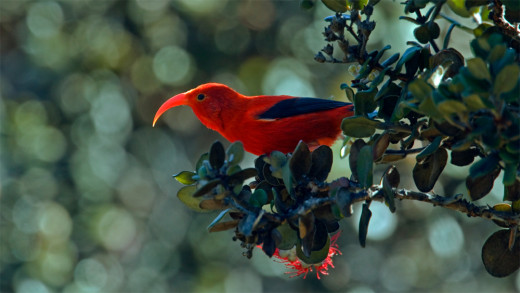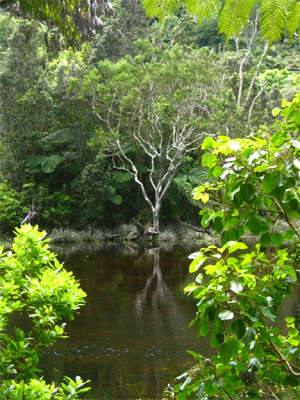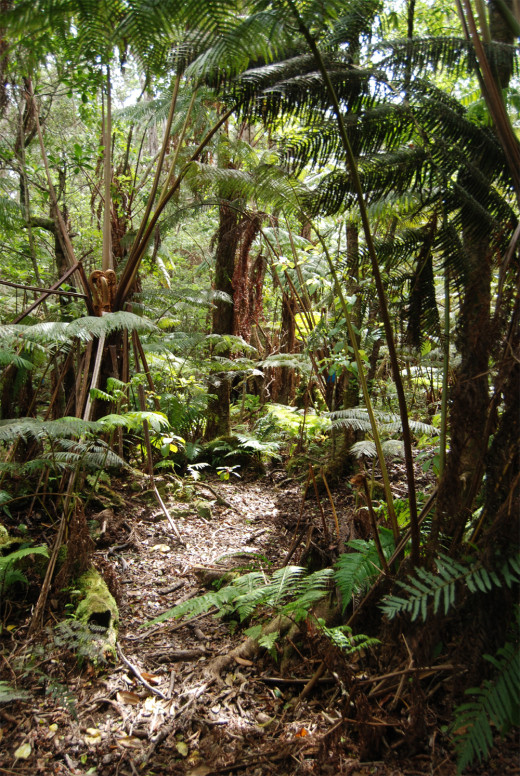HONOLULU — Today the Board of Land and Natural Resources approved a management plan for Pu‘u Maka‘ala Natural Area Reserve. The Land Board also approved Department of Land and Natural Resources (DLNR) issuance of a finding of no significant impact for the final environmental assessment for the plan.
“This management plan is part of the DLNR’s goal to increase protection of Hawaii’s forested watersheds, and to protect and restore rare native Hawaiian animals and plants such as the ‘I‘iwi, the Mauna Loa Silversword and the ‘Alalâ,” said William J. Aila, Jr., BLNR Chairperson.
The 18,706 acre reserve, on the east side of the island of Hawai‘i, was established in 1981 to protect native wet koa and ‘ohi‘a forests and habitat for rare species of plants and animals. Pu‘u Maka‘ala Natural Area Reserve (NAR) is managed by the DLNR’s Division of Forestry and Wildlife (DOFAW), and the overall management goal is to protect, maintain, and enhance the reserve’s unique natural, cultural, and geological resources.
The plan outlines specific actions needed to protect and enhance native Hawaiian ecosystems in the reserve including management of invasive species and restoration of rare and endangered plants and animals. Public access is allowed in the reserve and the management plan includes the enhancement of public access through trail improvements. New interpretive hiking opportunities will provide opportunities for the public to learn more about the reserve, its unique native species and ecosystems and ongoing management activities.
The plan discusses collaborating closely with partners, including Kûlani Correctional Facility, to achieve management goals. The Department of Public Safety is planning on reopening Kûlani in 2014.
“Before Kulani closed in 2009, inmate conservation worklines helped DLNR work to remove many invasive plant species, restoring parts of the reserve to its natural beauty,” said Department of Public Safety Director Ted Sakai. “This collaboration resulted in substantial cost-savings for the state and, in turn, gave inmates valuable education and work training opportunities. We are pleased to once again partner with the DLNR and reestablish these successful community service programs.”
The reserve is part of the state’s Natural Area Reserves System, created in 1971 by the Hawai‘i State Legislature to preserve and protect areas which support communities of the natural flora and fauna, as well as geological sites, both for the enjoyment of future generations and to provide baselines against which changes to Hawaii’s environment can be measured. The Natural Area Reserve System protects the best remaining ecosystems in the state, and actively manages them to preserve the natural heritage of Hawai‘i.
The Natural Area Reserve System presently consists of 20 reserves on five islands, encompassing more than 123,000 acres of the state’s most unique ecosystems. These diverse areas range from marine and coastal environments to alpine desert, and from fresh lava flows to wet forests and serve as habitat for rare native plants and animals, many of which are on the verge of extinction. The Natural Area Reserve System includes important watersheds and also contributes to the natural scenic beauty of Hawai‘i.
Fifteen species of federally listed endangered plants occur in or near Pu‘u Maka‘ala NAR, and DOFAW is planning to use the reserve as a key recovery site for these species. Pu‘u Maka‘ala is also home to endangered forest birds, the Nene and ‘Io. This area may also be considered as a potential future release site for captive-raised Hawaiian crow, or ‘Alalâ.
The management plan and final environmental assessment can be found here.
For more information about the project contact Lisa Hadway, Division of Forestry and Wildlife Hawai‘i Branch Manager at (808) 974-4221




by Big Island Video News1:48 am
on at
STORY SUMMARY
HONOLULU — Today the Board of Land and Natural Resources approved a management plan for Pu‘u Maka‘ala Natural Area Reserve. The Land Board also approved Department of Land and Natural Resources (DLNR) issuance of a finding of no significant impact for the final environmental assessment for the plan. “This management plan is part of the […]